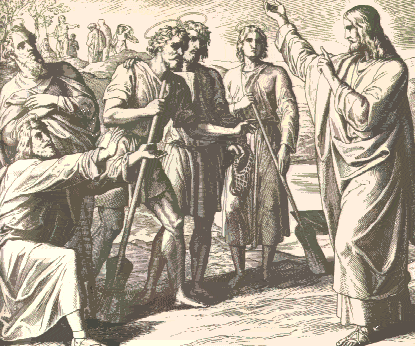This essay is in part based on the work of Joseph
Wheless (1930),
"Forgery
In Christianity".
One day, Jesus met Simon and gave him the nickname "Cephas", which
means "rock", or "petros" in Greek:
"And when Jesus beheld him, he said,
Thou art Simon the son of Jona: thou shalt be called
Cephas, which is by interpretation, A
stone."
(John
1:42)
Peter later accepts Jesus as the Christ, and a pleased Jesus blesses
Simon. In a punning reference to Simon's nickname, Jesus says
"Thou art Peter
(Petros), and upon this rock
(petra) I will build my church,....and I will
give unto thee the keys of the kingdom of heaven".
(Matthew
16:15-19).
| Su |
ei |
Petros |
kai |
epi |
taute |
petra |
oikodomeo |
mou |
ekklesia |
| You |
are |
Peter |
and |
upon |
this |
rock |
I will build |
my |
church |
Jesus' Petros-petra pun is poetic-prophetic in tone, and must have sounded
great, but is this really Jesus talking? When did he ever show a trace of
wit, or make a clever pun? He might have spoken these words, but the
evidence below will suggest that "Matthew" probably wasn't repeating Jesus'
actual words, but instead was writing what he wished Jesus had said
for the Greek audience of Matthew's time. As long as his proselytizing was
successful there, at that time, he may not have cared whether more literate,
critical readers elsewhere, centuries later would figure out what he was
up to. But, our case against Matthew and the punning verse does not rest
on the unbelievability of a pun in the mouth of the son of God; there is
much more, as we shall show below.
As evidence that Jesus may not have spoken the pun
elevating Peter to the head of his church, we may note that Matthew never
again mentions the extremely important fact that Peter is the head of Jesus'
church and heaven's gatekeeper. It is curious that Mark, who
allegedly was Peter's
companion and interpreter, reports Simon's confession, but not the crucial
"rock and keys" speech by Jesus
(Mark
8:27-33); if it had happened, he surely would have mentioned it.
It is
similarly odd that Luke and the authors of the Gospel of John say nothing
about it, either. Even Simon Peter himself never mentions a word of it to
anyone. As Wheless points out, Paul says that he often defied Simon Peter: "I withstood him to
his face,"
(Galatians
2:11) but in all their disputes, over matters of the faith and the fortunes
of the new "church", not a single one of the Apostles stepped forward to
put Paul in his proper place by pointing out that Simon Peter was Jesus'
hand-picked successor. Which is more likely: Matthew's rock and
keys passage is fictional, or this really happened, but Matthew was the only
one who knew about it?
It is doubtful that Jesus made Peter to the head
of his church and awarded him the keys to the kingdom of heaven, because
just before Jesus tells Simon he is giving him the keys to heaven, Matthew
has Jesus implying that the reason he was awarding Simon Peter the keys was
that Jesus' divinity was revealed to him by God:
"And Simon Peter answered and said, Thou art the
Christ, the Son of the living God". And Jesus answers, "Blessed thou art,
Simon: for flesh and blood hath not revealed it
unto thee, but my Father which is in heaven. And I say unto thee,
That thou art Peter, and upon this rock I will build my church; and the gates
of hell shall not prevail against it. And I will give unto thee the keys
of the kingdom of heaven."
(Matthew
16:15-19)
But, what was so special about Simon's statement? That Jesus was the son
of God was common knowledge. The Bible has many earlier references to Jesus
as the Christ, or son of God. Indeed, Mark, who said nothing about the rock
and keys, says that the following happened before Simon's confession: "And
there was in their synagogue a man with an unclean spirit; and he cried out,
Saying, Let us alone; what have we to do with thee, thou Jesus of Nazareth?
art thou come to destroy us? I know thee who thou
art, the Holy One of God."
(Mark
1:21-23)
Given this earlier recognition of Jesus' messiahship in Mark, it's no wonder
that Mark in his later chapter did not make Jesus see signs of revelation
in Simon's confession. Matthew, however, implies that Jesus felt that Peter's
recognition had come in a special revelation from God and that he thus merited
the great reward which Catholic Encyclopedia (xiii, 261) says Jesus
bestowed upon him "for the original(!) and inspired discovery." But,
many others had already conceded that Jesus was the Christ, so the far-fetched
implications in
Matthew
16:17-19 stand as further circumstantial evidence that Matthew's rock
and keys story is fictional. |
